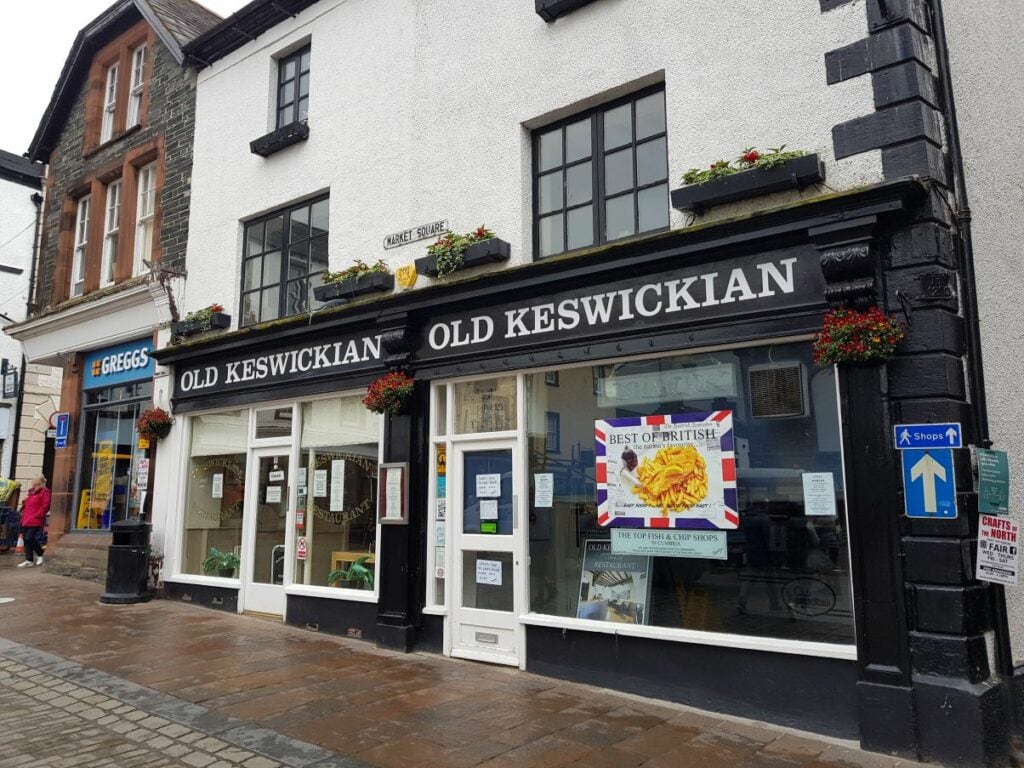
There was a pop-up preacher in Keswick’s Market Square this week. His message was that we could all benefit from a spot of divine intervention – and in the nearby Old Keswickian chippy, owner Alan Simpson was not inclined to disagree.
“Things have gone to hell in a handcart recently,” he said. “This year is the worst I can remember, much worse than anything during Covid. At least then you felt you had a bit of control over things. But now…”
It’s clear that, as the summer season approaches, small independent businesses in Keswick are reeling under an unprecedented series of body blows.
Last month, the Reminder highlighted the desperate shortage of staff in the town, which has led to some cafes, restaurants and retail outlets being forced to temporarily close their doors to customers.
This month, it seems the humble chippy – so much a part of the British holiday tradition – has been singled out for a battering all of its own.
According to the National Federation of Fish Friers, the UK’s fish and chip industry is facing its biggest challenge in its 160-year history, with dozens forced out of business due to rocketing fish and cooking oil prices, the cost of the energy required to fry the food, and consumers battening down the hatches against the cost-of-living crisis.
“With Covid and then this, it’s just too much,” federation president Andrew Crook said this week. “Some which closed, the cheaper ones, just couldn’t show the price increase; quite a few that were coming up to retirement have just given up.”
The Old Keswickian is not the only chip shop in Keswick, of course. But it’s been an iconic presence in the town centre for over 40 years, and its current problems are symptomatic of the industry as a whole.
Alan Simpson took over the family business in 1998 and heads up a team which, in high season, can be as many as 30-strong. Whether that will be the case this year remains to be seen.
“We’re getting absolutely clobbered,” he said. “In recent weeks the price of a unit of fish has increased by £80 to £175, and cooking oil has gone up from £10.50 to £17. On top of that you’ve got energy bills which will probably increase by about 250 per cent this year.
“The simple solution would be to put up the prices of our fish and chips – but this is Keswick. Everywhere you look there’s a sandwich shop or a take-away. People will just go where it’s cheaper.”
The war in Ukraine is being blamed for the steepling prices and shortages of raw materials essential to businesses like Alan’s.
Half of all the sunflower oil used by UK fish and chip shops comes from there, while up to 40 per cent of cod and haddock comes from Russia – and government sanctions on Russian white fish will make these North Sea supplies scarcer and pricier.
Meanwhile fertiliser for potatoes – mainly from Russia – has tripled in price. And as costs surge, profit margins dwindle.
“We’ve increased prices in our restaurant by 10 per cent, but there’s not much else that we can do other than take it on the chin and hope things improve,” Alan said.
A few streets away, in the office of Davies Taxis, partner Caroline Jenkinson is similarly gloomy.
“This business started in 1965, and we’ve had our ups and downs, certainly in recent years,” she said. “During the worst of the pandemic we were fighting to keep the business afloat. But it’s never been as bad as this.”
Caroline’s problem is soaring fuel prices – again, a direct consequence of events in Eastern Europe. This week, the price of unleaded on Keswick forecourts hit £187 per litre and diesel £191. For the average taxi, that means it already costs over £100 to fill a tank, compared to around £80 a year ago.
“The only good news is that Allerdale council are likely to increase the tariffs, which haven’t changed for years,” Caroline says. “But if fuel prices keep going up, then how can we hope to keep up?
This week the AA released figures which showed that the average car owner in Allerdale could face an annual rise of more than £200 in the cost of petrol as living costs mount.
The motoring organisation said soaring prices, which have topped more than 200 pence per litre at some forecourts, have seen some motorists swap their fuel-powered cars for electric alternatives, while others on lower incomes have had to sell their cars entirely.
On average, the cost of a litre of petrol in Allerdale stood at £1.86 over the four days to June 14, according to figures from petrolprices.com – up 42 per cent from £1.31 over a week in early June last year.
Department for Transport figures show the average annual mileage of a car driver in the North West was 3,115 miles in 2018-19 – the latest figures before the onset of the coronavirus pandemic, which significantly impacted travel habits.
At current prices in Allerdale, a driver travelling this distance would spend an average of £730 on filling up a petrol car over the year – up from £515 based on prices in June last year.
Diesel drivers doing the same mileage would see their costs rise by 38 per cent, from £459 to £634.








